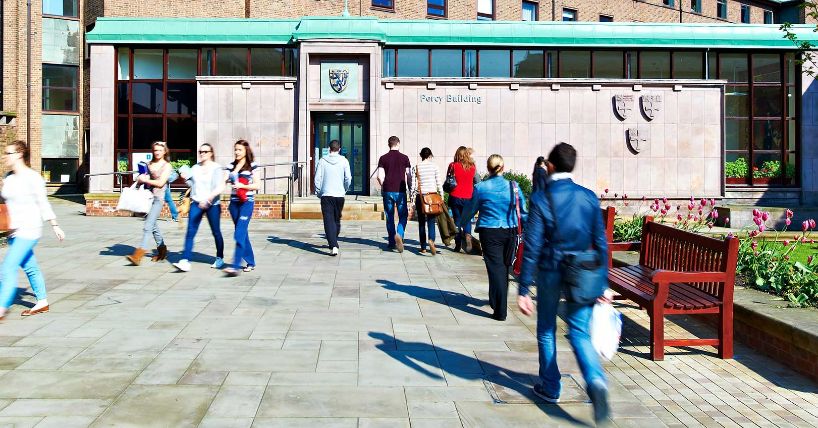Staff Profile
Dr Hayley Toth
Leverhulme Trust Early Career Fellow
Hayley G. Toth is a Leverhulme Early Career Fellow in the School of English Literature, Language and Linguistics. Before joining Newcastle in 2023, Hayley worked as a Post-Doctoral Research Assistant to Professor Merve Emre at the University of Oxford (2021-23), and held a Post-Doctoral Research Fellowship at the Leeds Arts & Humanities Research Institute (2020-21). She completed her PhD at the University of Leeds (2016-2020) under the supervision of Professor Brendon Nicholls.
Hayley has published essays and reviews in Interventions: International Journal of Postcolonial Studies, Journal of Postcolonial Writing, Post 45 Contemporaries, Modern Language Review, Comparative Critical Studies, African Identities, Journal of Political Ideologies, and Key Words: A Journal of Cultural Materialism. She is the author of Reading Postcolonial Literature: From Professional to Non-Professional Practices (Liverpool University Press, 2025). She is currently working on her second monograph Collective Form: Cultural Collaboration in Black Liberation Struggles, 1976-82.
Qualifications
PhD, English Literature (University of Leeds)
MA by Research, English Literature (University of Huddersfield)
BA (Hons), English Language and Literature (University of Huddersfield)
I work at the intersections between postcolonial studies, literary sociology and book history, and am broadly interested in postcolonial literature as a social, historical and institutional form. My work to date has explored practices of reading postcolonial literature, the relationship between reading and ideology, apartheid literary activism, and the politics of literary pedagogies.
My first book, Reading Postcolonial Literature: From Professional to Non-Professional Practices (Liverpool University Press, 2025) places non-professional reading practices in dialogue with received academic wisdom to debunk common-sense assumptions about non-professional readers as ‘western’ or ‘neo-colonial’ consumers. Drawing on reading practices recorded in academic books, journal articles and on online book-reviewing platforms like Amazon and Goodreads, the book draws attention to important continuities between professional and non-professional practices of reading postcolonial literature. At the same time, I highlight that non-professionals often have little desire to emulate the practices of professional postcolonial critics. Precisely by not adopting the established protocols and methods of postcolonial studies, non-professional readers call attention to the limits of dominant approaches to reading in the discipline.
My second book, Collective Form: Cultural Collaboration in Black Liberation Struggles, 1976-82, is based on a Leverhulme Early Career Fellowship of the same name. Collective Form investigates the proliferation of collective forms of literary production, consumption, and performance between 1976 and 1982. It analyses how Black activists theorised and exercised cultural collaboration as a practice of organised resistance against systems of cultural, material, and political dispossession. My aim is to clarify the role of print and performance cultures in instantiating political change, and reassess the paradigmatic status of individual authors, texts, and readings in postcolonial studies.
I have presented research from Collective Form at the Newcastle Postcolonial Research Group's Work-in-Progress seminar, the International Research Network on Postcolonial Print Cultures, and the American Comparative Literature Association's annual conference, and have upcoming talks in Paris at a workshop of the International Research Network on Postcolonial Print Cultures, and in Tübingen at the first conference of the Ephemeral Network.
In June 2024, I organised a two-day, interdisciplinary symposium at Newcastle University titled COLLECTIVE FORM AND NATIONAL LIBERATION. Its aim was to bring together scholars interested in the role of collaboration, cooperation and collectives in struggles for racial justice, national liberation and decolonisation, and to ask how the perspective of collective form changes the questions we ask and the conclusions we draw in postcolonial studies. You can read more about the symposium on the following website.
SEL 1035 Revolutions (2024/25)
I hold Associate Fellowship of the Higher Education Academy (AFHEA), and have previously taught at the University of Huddersfield and the University of Leeds.
-
Articles
- Spowage K, Toth HG. Reading and Ideology: The Case of the Free Public Libraries Movement. Journal of Political Ideologies 2024, 29(3), 513-532.
- Toth HG. Reading in the Global Literary Marketplace: Material and Textual Affects. Interventions: International Journal of Postcolonial Studies 2021, 23(4), 636-654.
- Toth HG. Spivak's Planetarity and the Limits of Professional Reading. Comparative Critical Studies 2020, 17(3), 459-478.
- Toth HG, Nicholls B. A Dialectical Literary Canon?. African Identities 2020, 18(1-2), 41-63.
- Toth HG. "No Longer Young and Not Yet Old" London: Spatio-Temporal Ambivalence in Hanif Kureishi's Something to Tell You. Identity Papers: A Journal of British and Irish Studies 2017, 3(1), 44-71.
-
Authored Book
- Toth HG. Reading Postcolonial Literature: From Professional to Non-Professional Practices. Liverpool: Liverpool University Press, 2025.
-
Book Chapter
- Toth HG. Reading in the Global Literary Marketplace. In: Bill Ashcroft, Gareth Griffiths, and Helen Tiffin, ed. The Postcolonial Studies Reader. London, UK: Routledge, 2024, pp.484-489.
-
Online Publication
- Toth HG. Bad Reading / Bad Gaming. Post45 Contemporaries, 2024. Available at: https://post45.org/2024/04/bad-reading-bad-gaming/.
-
Research Dataset/Database
- Emre M, Toth HG. Post-Discipline Online Syllabus Database. 2022. Oxford: Oxford Sustainable Digital Scholarship Platform, 271.31kB.
-
Reviews
- Toth HG. The Bloomsbury Handbook of Postcolonial Print Cultures, edited by Toral Jatin Gajarawala, Neelam Srivastava, Rajeswari Sunder Rajan and Jack Webb. Key Words: A Journal of Cultural Materialism 2024, 22, 130-133.
- Toth HG. Salman Rushdie in Context, edited by Florian Stadtler. Journal of Postcolonial Writing 2024, 60(5), 722-723.
- Toth HG. South African London: Writing the Metropolis after 1948, by Andrea Thorpe. Journal of Postcolonial Writing 2023, 60(1), 113-114.
- Toth HG. The Critical Industry. Critical Branding: Postcolonial Studies and the Market, by Caroline Koegler. Interventions: International Journal of Postcolonial Studies 2021, 23(8), 1204-1206.
- Toth HG. The Bloomsbury Introduction to Postcolonial Writing: New Contexts, New Narratives, New Debates, edited by Jenni Ramone. Modern Language Review 2019, 114(2), 372-373.
